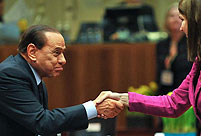 Air Forces arrive at designated area to join China-Russia drill
Air Forces arrive at designated area to join China-Russia drill
 High temperature hits Shanghai
High temperature hits Shanghai
 Old town Dali hosts int'l photography exhibition
Old town Dali hosts int'l photography exhibition
 Death toll rises to 29 in rain-related accidents across Pakistan
Death toll rises to 29 in rain-related accidents across Pakistan
 Baby returned to parents after allegedly being trafficked
Baby returned to parents after allegedly being trafficked
 Nutrica recalls Karicare infant formula in New Zealand
Nutrica recalls Karicare infant formula in New Zealand
 Sexy models in CFGP race
Sexy models in CFGP race
 Child labor still remains rampant in war-hit Afghanistan
Child labor still remains rampant in war-hit Afghanistan
 Sun Yang the star of last day at World Swimming Championships
Sun Yang the star of last day at World Swimming Championships
Related:
>> China in top three tourist destinations
If China's media is to be believed, Chinese tourists visiting foreign countries have become the new "ugly Americans". Hardly a day goes by without some report of boorish and culturally insensitive behavior on the part of Chinese traveling overseas.
For example, some "rude Chinese tourist" stories published online go straight to most read articles. And this summer, photos of middle-aged Chinese-looking females dipping their feet in the Louvre fountain were splashed all over the Chinese media. Two of the accompanying headlines screamed "Foreigners dumbfounded as Chinese turn Louvre fountain into feet-washing basin" and "Chinese feet-washing army takes over Louvre".
However, bloggers in China noted that the matronly ladies in the Louvre photographs could have been from other Asian countries. And other shots taken that day at Louvre showed many Western visitors dipping their feet into the museum's fountain. Given the terrible heat wave gripping Europe this summer, these people can hardly be blamed for wanting to cool off a bit.
To be sure, many Chinese going overseas do behave as stereotypical "tourons", which stands for "tourist plus moron". They typically take package group tours which are crammed with lightening fast visits in out and of "famous" places, mainly so those making the trip can snap a quick photo and say to friends and family, "I was there."
Moreover, large numbers of the tourists visit foreign countries mainly to shop. According to Jiang Yiyi, a researcher at the Chinese Tourism Academy, cited in an Aug 17, 2012 Guardian article, some Chinese tourists spend 100,000 yuan (about $16,000) on shopping alone. And Global Blue, a shopping tourism company, notes that 20 percent of all duty-free shopping is by Chinese customers.
However, Chinese tourists are hardly unique in being dedicated shopaholics, nor do they have any monopoly when it comes to buying kitsch. In fact, an American friend who worked as New York City tour guide while attending Columbia University - this was before masses of Chinese tourists began visiting the Big Apple - once said he was "appalled at all the kitsch purchased by foreign tourists."
When instructing English at a no-name university during my first year in China, I saw a similar behavior pattern among the older American teacher colleagues. As we pulled into the Terra Cotta Warriors Museum parking lot on a group trip to Xi'an of Shaanxi province, our Chinese guide warned us not to buy the miniature soldiers hawked by local farmers, saying that they were shoddy and overpriced. But an older instructor, a 60-something lady, said not once, but twice, "Can't we just bargain them down!"
It was as if our main purpose in going there was to haggle with farmers over tacky souvenirs rather than seeing Emperor Qinshihuang's terra cotta army. For this teacher and the other older instructors, all of whom made no effort to study Mandarin or learn about Chinese culture, the big country was one big flea market for buying things on the cheap.
Despite my strong dislike for tourists, I am willing to cut Chinese tourists some slack in both the group tour and shopping areas. Unlike Western Europeans, Chinese people do not have long vacations, so seeing a lot in one short go is often done out of necessity. And thanks to import duties and high taxes, luxury goods are much less expensive to buy overseas than in China.
Thus the number of serious travelers, vs. tourists, is on the rise in China. This could not come soon enough, as Chinese tourists are creating a serious image problem for their country.
But as much as people in other places heavily visited by Chinese tourist might kvetch about the latter's conduct, they are also surely quite happy to see these visitors part with their money. Before complaining about Chinese behavior, foreigners should remember who is helping to butter their bread.
The author is an American corporate trainer in China.
 Air Forces arrive at designated area to join China-Russia drill
Air Forces arrive at designated area to join China-Russia drill  Hospital comes to aid of tragic family of ‘Chinese Cabbage Dad’
Hospital comes to aid of tragic family of ‘Chinese Cabbage Dad’ Czech artist performs bubble show at Hong Kong mall
Czech artist performs bubble show at Hong Kong mall  Italian Supreme Court confirms Berlusconi's jail verdict
Italian Supreme Court confirms Berlusconi's jail verdict Run naked as punishment for missing sales target
Run naked as punishment for missing sales target International Grand Bazzar in Urumchi,Xinjiang
International Grand Bazzar in Urumchi,Xinjiang  Chinese troops of "Peace Mission - 2013" arrive at exercise area
Chinese troops of "Peace Mission - 2013" arrive at exercise area Pakistan's rain-triggered accidents claim 29 lives: media
Pakistan's rain-triggered accidents claim 29 lives: media Anti-hijacking drill held on train in Wuhan
Anti-hijacking drill held on train in Wuhan Top 10 most dangerous jobs in the world
Top 10 most dangerous jobs in the world Zhang Ziyi graces Femina magazine
Zhang Ziyi graces Femina magazine Breathtaking images of extreme sports
Breathtaking images of extreme sportsDay|Week|Month